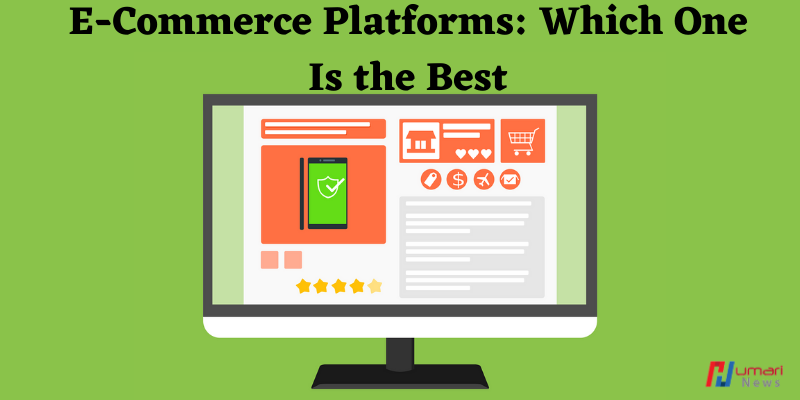Traditional marketplaces are converting into large digital, online-run marketplaces. It is largely due to the technological revolutions of this era. Most e-commerce websites used to run on standalone, monolithic software systems with a proper integration system in place. However, these software solutions were costly & unscalable. They also required a large IT team for setup and maintenance. If you’re running a physical business yourself, you can imagine how disastrous this approach could be. Fortunately, a solution to this problem now exists for e-commerce businesses; E-commerce platforms!
E-commerce platforms are software that seamlessly integrates commerce and business logic. With a united infrastructure, the business can provide a fairly unique and personalized experience to consumers online. This article is all about the best e-commerce platforms. To judge the services available to businesses, we judge each service based on these factors:
- Provision of customer support
- Order and Inventory management
- Pricing
- Scalability (growth if customer base shoots up way too quick)
- Analytics and reporting
- Customer experience
Also Read:
- How to Launch a Successful Marketing Campaign for your E-Commerce Store
- How Much E-Commerce Is Effective In Pakistan?
- Magento Or Shopify – Which One Is Good For My Business?
Most Famous E-Commerce Platforms:
There are hundreds of e-commerce platforms for both B2B and B2C companies. However, not all of them are worth your time or money. Furthermore, some just fail to provide services that are important to your business. Let’s take an in-depth look at each e-commerce platform next:
Shopify
Based on customer acceptance and experience, Shopify is the leading eCommerce platform for quite some time. Fast loading time, hundreds of external application support, and a super-easy setup, make it a great option for beginners & medium-sized businesses alike.
Application Support – One of the best features is the application or plugin support. If you have a feature in mind that could help you be productive, it’s highly likely that such an application is already present in Shopify’s app store.
Ease of Use or Customer Experience – The main issue with traditional systems was the requirement of developer expertise. Shopify cuts the hassles and provides a fairly intuitive and easy-to-use interface to interact with your business and customers online.
SquareSpace
SquareSpace is right behind Shopify and is yet another amazing eCommerce platform for beginners. Although SquareSpace follows an easy-to-use and interactive user interface, we do not recommend it for larger eCommerce stores. One of the reasons why we’re saying that is the lack of payment gateways and eCommerce integration – which makes it optimal for businesses just starting out and aiming to set up a customer base. E-commerce platforms have to be personalized. Same-old designs or plagiarized work won’t sit well with consumers. SquareSpace has a large array of template designs for you to choose from and customize according to your preference.
WooCommerce
WooCommerce is one of the largest eCommerce platforms in the world. One can use it to convert a simple website into a full-fledged online commerce store. One of the best features? WooCommerce is an open-source platform, meaning it is entirely free for commercial purposes.
It has hundreds of extensions and plugins which can collaborate to amp up the user’s experience. WooCommerce also has extensive support for SEO plugins. You can use it to market your store or rank higher in search engine searches.
The only shortcoming with WooCommerce is its customization. The platform requires little expertise to move around and customize the website as per needs. An experienced professional might be costly. But can determine problems easily unlike a non-technical person.
OpenCart
Like WooCommerce, OpenCart is an open-source eCommerce platform as well. The platform has everything you could ever wish for in a similar service. From inventory to shop management, categorization to extensive payment support, it has everything. The plugin & extension support is one of the most beloved features of OpenCart. You can customize and modify to personalize the experience of the customers based on your unique business idea. However, a shortcoming most consumers find is the lack of integration of various plugins. Third-party plugins can often fail to perform altogether. Moreover, it is a little costly as well, to purchase the themes and plugins required to create the eCommerce experience.
Magento
If customization and personalization is your sole concern, Magento is your ‘online soulmate’. The extensions allow owners to massively change the shopping experience of customers. It has great support for Search Engine Optimization (SEO) and can help market your business easily. But despite its popularity, it is not easy to develop applications using Magento. Often, you’ll be requiring developer support to get the most of it. Although its starter packages are free, but enterprise-level subscriptions are quite costly and so is true for themes on Magento.
Wix
Wix is more like a website-builder. But it has extensive support for building eCommerce online stores. Since it follows a drag-and-drop mechanism to interact with the website, it is incredibly easy to use by non-technical people. Wix offers hundreds of templates in their paid subscription. Also, it features several functionalities like shopping carts and payment methods built-in. However, the only concern with most consumers is the lack of integration with core eCommerce applications or features. Therefore, if you’re looking for an inexpensive option to just start your online store, Wix is the best option. You can always move towards other platforms if you wish to expand or scale your store.
E-commerce Stores – Final Thoughts
Online businesses are on the rise. This trend is not going to fall in the near future. As it so happens, physical businesses with remarkable success are going online as well. This opens their doorway to a whole new customer base and improves business operations.
Soon, physical stores will lose their importance. Keeping that in mind, business owners and runners will be needing such eCommerce platforms to better market their business and run it online. The only question which needs to be answered is; what do you want in your online store?








1 Comment